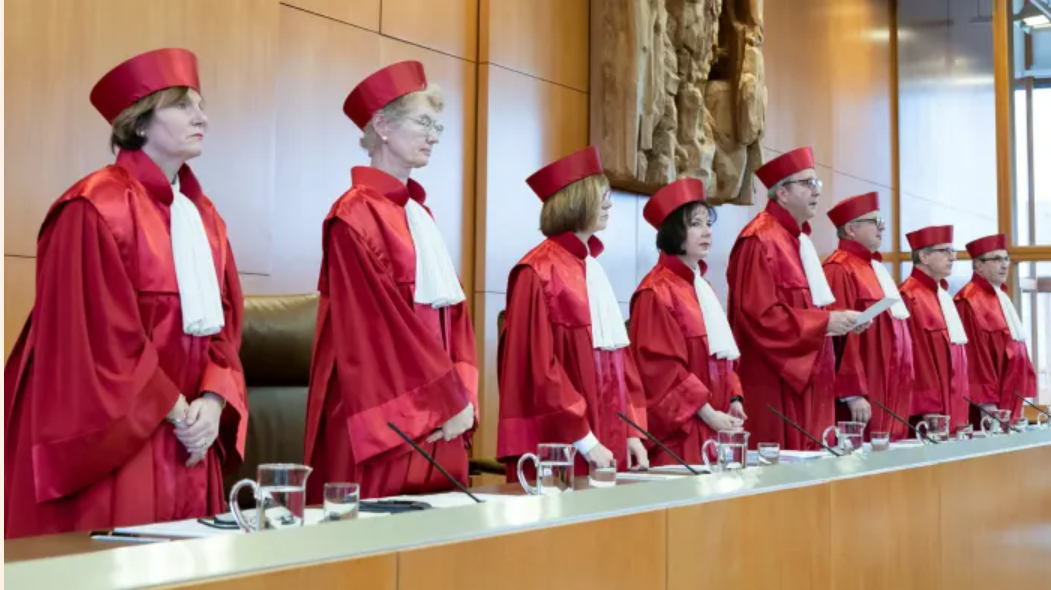Skal investorerne til at investere mere i virksomheder, der investerer heftigt i klimaforbedringer? Deutsche Bank analyserer virkningen af den nylige dom i den tyske Forfatningsdomstol. Dommen kritiserer politikernes beslutning om CO2-reduktion per 2030 – de skal gå meget længere, så de ikke bliver en belastning for kommende generationer. Det skaber en helt ny energi- og klimapolitik, som kan få store politiske og samfundsmæssige konsekvenser, mener Deutsche Bank, som konkluderer, at det kan presse regeringer og virksomheder til at investere meget mere i klima-relatereret forskning og udvikling, og derfor kan det få investeringsniveauet til at blive en vigtig parameter for investorer fremover.
Constitutional Court: Calling for technological progress
The Federal Constitutional Court’s “climate change order” has the potential to trigger considerable political and social disruption.
The greenhouse gas emission reduction targets set by policymakers will have implications for our everyday lives. Political and social resistance appears inevitable. We need better climate technologies. Better technology is key if we want to keep climate-related restrictions to individual freedom as well as political and social tensions as low as possible, both now and in the future.
Perhaps we should regard the Court order as a call for much higher investments in research and development.
At the end of April, the Federal Constitutional Court published its order on the constitutional complaints against the Federal Climate Change Act. The ruling instantly made the headlines. The Court focused on the fact that the provisions of the Federal Climate Change Act only cover the years until 2030. The order says clearly that there is a lack of “sufficient specifications for further emission reductions from 2031 onwards”.
The Court explains that the “fundamental rights afford the complainants protection against comprehensive threats to freedom caused by the greenhouse gas reduction burdens … being unilaterally offloaded onto the future”. Moreover, the Court says “one generation must not be allowed to consume large portions of the CO2 budget while bearing a relatively minor share of the reduction effort if this would involve leaving subsequent generations with a drastic reduction burden and expose their lives to comprehensive losses of freedom”.
In effect, the judges’ main point of criticism is that the burden of reducing greenhouse gas emissions is not distributed justly over time.

Political and social resistance likely
Interpreting the ruling is clearly a matter for legal experts. From an economist’s vantage point, however, the skeptics seem to have a point. Economists tend to be suspicious of any restrictions to freedom, either today or in the future; remember that von Hayek has not been the first or the only economist to regard individual freedom as a precondition for prosperity and innovation. From an economic vantage point, however, negative external effects of climate change clearly need to be internalised by putting a price on carbon emissions.
Still, there is another issue which gives rise to great concerns, namely the disruptive potential of the climate decision. It might drive a much larger wedge into the political sphere and into society than either the euro crisis, the refugee crisis or the measures to combat the COVID-19 pandemic. Why?
According to the Federal Constitutional Court, future generations must not be left with a “drastic reduction burden”. They must be protected from being “forced to engage in radical abstinence” in order to preserve the “natural foundations of life”. This is, of course, fully understandable. However, the Court does not say anything about how to implement “radical abstinence” measures up until 2030.
If reducing greenhouse gas emissions was that easy, we would have been much more successful in this endeavour over the last few years. Remember that, without the corona crisis and its huge economic costs involving hundreds of billions of euros, Germany would have widely missed its climate target for 2020 (CO2 emission reductions by ~40% vs 1990). By 2030, German CO2 emissions are now to be down 65% vs 1990. This means a reduction by almost 43% from the low level of the “corona year” 2020.
However, people’s behaviour – just think of individual mobility, more living space per capita, increased use of IT or high meat consumption – runs counter to these climate protection goals. Once the corona-related restrictions are lifted, many people will want to travel and enjoy their freedom again. In the years after the pandemic, the number of those willing to accept far-reaching abstinence will be quite small.
This means that people will consume, cause CO2 emissions and thus encroach upon the freedom of future generations within the meaning of the Court order. While some people may be willing to reduce their consumption in the future, most consumer preferences are quite static. People find it easier to agree to abstract, future consumption abstinence than to reduce their consumption today. Take an example from another area of life to illustrate the dilemma. According to survey results, an overwhelming majority of Germans believe that the difference between high and low incomes is excessive and desire a “juster” distribution of income. Only a few of them, however, are indeed willing to accept lower incomes or pay higher taxes so that others have more money at their disposal.
The greenhouse gas emission reduction targets will have implications for our everyday lives. Political and social resistance appears inevitable. Considerable increases in CO2 and, in turn, energy prices or restrictions to well-established freedoms by way of command and control regulation will be controversial. Moreover, the economic and social price is quite high. Resistance is already coming to light in the Bundestag debates.
The Court order has not changed anything about the fact that announcing ambitious long-term carbon reduction targets is much easier than actually achieving them or implementing the necessary measures. Following the ruling, people have already coined a new expression: “climate lockdown”. After all, the order brushes aside the predominant climate policy narrative, which is behind the EU Green Deal, for example. The Green Deal calls climate neutrality a “new growth strategy” where “no one is left behind”. It does not mention widespread restrictions to individual freedom.
Climate protection is ultimately an energy issue
Climate protection ultimately comes down to an energy issue. However, there is currently no source of energy which offers sufficient performance (in terms of absolute energy output and security of supply), adequate cost efficiency and low carbon intensity and is politically acceptable. Each source of energy has its strengths and weaknesses. Moreover, apart from pumped storage power plants, there are currently no large-scale, cost-efficient power storage options.
In addition, “we Germans” know quite well what we do not want: no coal, no natural gas and no fossil fuels in the long run, and certainly no nuclear energy. And we are not willing to accept wind turbines or power distribution networks in our neighbourhood either. Carbon capture, usage and storage technologies have been pooh-poohed almost before they were even developed. Beyond all that, the public focus in the debate about the energy transition on electricity production is misleading. While renewable energies had a share of 44% in gross power production in 2020, electricity has only a share of 20% in total German final energy consumption. Final energy consumption in the transport sector alone is 50% higher. And in 2020, fossil fuels and nuclear energy had an aggregate share of 82% in total primary energy demand in Germany.
How can this problem be resolved? As this is only a brief comment, I will give a short answer: We need better climate-protection technologies. Better technology is key if we want to keep climate-related restrictions to individual freedom as well as political and social tensions as low as possible, both now and in the future. Perhaps we should regard the Court order as a call for much higher investments in research and development.











